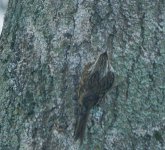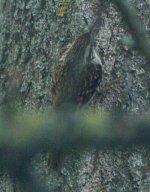2slo
Well-known member
Hi,
As the light failed today I saw this bird climbing vertically down the bark of one of my trees. The two photos show it as it had turned round and was climbing back up. About the size of a blackbird, quite long downward curving thin beak, reddish brown mottled feathers on top, light grey almost white underside. Long forked tail. Feet like a Woodpecker and had a gait similar to a G S Woodpecker. Walked out of sight, I didn't see it fly. I'm guessing it's a Treecreeper from pictures I've been looking at but I'm not sure. Anyone know please?


Thanks,
Mark |=)|
As the light failed today I saw this bird climbing vertically down the bark of one of my trees. The two photos show it as it had turned round and was climbing back up. About the size of a blackbird, quite long downward curving thin beak, reddish brown mottled feathers on top, light grey almost white underside. Long forked tail. Feet like a Woodpecker and had a gait similar to a G S Woodpecker. Walked out of sight, I didn't see it fly. I'm guessing it's a Treecreeper from pictures I've been looking at but I'm not sure. Anyone know please?


Thanks,
Mark |=)|



